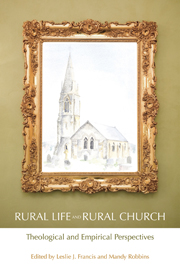Book contents
- Frontmatter
- Contents
- Preface
- Foreword by The Bishop of Shrewsbury, The Rt Revd Mark Rylands
- 1 Introduction: shaping rural theology
- PART 1 PERSPECTIVES FROM THE BIBLE
- PART 2 PERSPECTIVES FROM ORDINARY THEOLOGY
- PART 3 THEOLOGICAL AND SOCIOLOGICAL PERSPECTIVES
- PART 4 HISTORICAL PERSPECTIVES
- PART 5 LISTENING TO VISITORS
- PART 6 LISTENING TO THE COMMUNITY
- PART 7 LISTENING TO CHURCHGOERS
- PART 8 LISTENING TO CHURCH LEADERS
- PART 9 SATISFACTION AND STRESS IN MINISTRY
- 27 Burnout and the practice of ministry among rural clergy: looking for the hidden signs
- 28 How happy are rural Anglican clergy?
- 29 Perceptions of stress on those in rural ministry: listening to church leaders
- Contributors
- Sources
- Subject Index
- Name Index
28 - How happy are rural Anglican clergy?
from PART 9 - SATISFACTION AND STRESS IN MINISTRY
- Frontmatter
- Contents
- Preface
- Foreword by The Bishop of Shrewsbury, The Rt Revd Mark Rylands
- 1 Introduction: shaping rural theology
- PART 1 PERSPECTIVES FROM THE BIBLE
- PART 2 PERSPECTIVES FROM ORDINARY THEOLOGY
- PART 3 THEOLOGICAL AND SOCIOLOGICAL PERSPECTIVES
- PART 4 HISTORICAL PERSPECTIVES
- PART 5 LISTENING TO VISITORS
- PART 6 LISTENING TO THE COMMUNITY
- PART 7 LISTENING TO CHURCHGOERS
- PART 8 LISTENING TO CHURCH LEADERS
- PART 9 SATISFACTION AND STRESS IN MINISTRY
- 27 Burnout and the practice of ministry among rural clergy: looking for the hidden signs
- 28 How happy are rural Anglican clergy?
- 29 Perceptions of stress on those in rural ministry: listening to church leaders
- Contributors
- Sources
- Subject Index
- Name Index
Summary
Abstract – A sample of 722 Church of England clergy who are responsible for three or more rural churches (excluding those who work in team ministries) completed the Oxford Happiness Questionnaire. The data produced are considered in the context of work-related psychological health, whereby the ‘happiness’ of rural clergy is seen as part of a broader picture which presents ‘positive affect’ as a counterbalance to ‘negative affect’. These data suggest that while the majority of rural clergy do experience moderately high levels of ‘happiness’ in their work environments, the benefits of this positive affect are often diminished by the presence of the enormous demands placed upon them in rural multi-parish benefices at the beginning of the twentyfirst century.
Introduction
The decline in the number of stipendiary parochial clergy in the Church of England from 15,446 in 1993 to 8,764 in 2005 (Church Society, 2007) has resulted in the amalgamation of many rural parishes, which has caused widespread ‘overextension’ amongst rural clergy. This article, which looks at ‘subjective wellbeing’ amongst rural clergy in the context of work-related psychological health, makes the assumption that the happiness of rural clergy is best assessed as part of a broader picture which presents ‘positive affect’ as a counter balance to ‘negative affect’. In order to present ‘happiness’ among rural clergy in context, therefore, this article will first look at some of the factors which cause negative affect (in the form of ‘overextension’, ‘stress’ and ‘emotional exhaustion’) within this group of people. Definitions of ‘happiness’ and ‘subjective wellbeing’ will then be offered; the Oxford Happiness Questionnaire (OHQ: Hills and Argyle, 2002), which has been used in the present study, will be outlined and previous research which has looked at subjective wellbeing among the clergy will be reviewed.
- Type
- Chapter
- Information
- Rural Life and Rural ChurchTheological and Empirical Perspectives, pp. 325 - 336Publisher: Acumen PublishingPrint publication year: 2012

